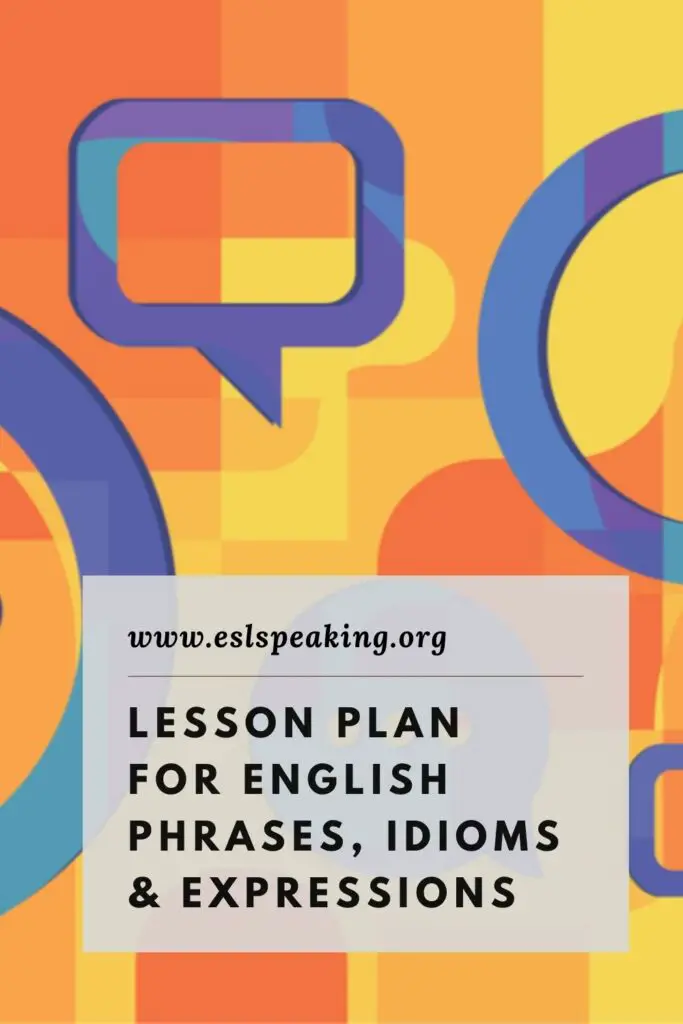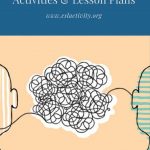Are you an English learner who wants to learn how to speak like a native speaker by using English phrases and idioms? Then check out this dialogue and practice filled with lots of them! Being able to learn how to use common phrases like “How have you been” will make you a more advanced English learner.
Or, maybe you’re an English teacher who is looking for a lesson plan for their higher-level students. Print off this one and get to work! It’s a nice solution for busy TEFL teachers.

English Phrases and Expressions
Dialogue with English Phrases and Idioms
Jerry: Why are all of our coworkers living hand to mouth? We get paid a living wage. I
can’t make heads nor tails of it.
Linda: Well, I think most of them hit the bottle pretty hard after work every day. That costs a
pretty penny. But, your guess is as good as mine.
Jerry: I’ve noticed that too. I used to drink a lot but now it’s only once in a blue moon. I had
to quit cold turkey for a couple of years before I could get a handle on it.
Linda: Good for you for making a big change like that! Plus, it’s saved you a lot of money I’m
sure.
Vocabulary
Once in a blue moon: Something that doesn’t happen often.
Quit cold turkey: Suddenly stop doing something addictive. Most commonly refers to
smoking.
Living hand to mouth: To live paycheck to paycheck. Not having lots of money, especially
disposable income.
Living wage: Salary that is high enough to cover all the monthly bills relatively easily.
Your guess is as good as mine: To not know something.
Hit the bottle: Drink alcohol.
Get a handle on it: To control something.
Costs a pretty penny: Is expensive.
Can’t make heads nor tails of it: Unable to understand something.
Drink a lot: Consume lots of alcohol.
Exercise
Fill in the blanks with the correct phrase or idiom
1. My dad _____ hard when I was a kid.
2. That new car I want _____.
3. I’m going back to school so I can find a job that pays a _____.
4. I only eat junk food _____.
5. I want to quit smoking but it’s difficult to _____.
6. I’ve heard that the best way to stop smoking is to _____.
7. It’s often hard for single parents to avoid _____.
8. Math just isn’t my subject! I _____.
9. Wow! They sure do _____.
Answers:
1. hit the bottle
2. costs a pretty penny
3. living wage
4. once in a blue moon
5. get a handle on it
6. quit cold turkey
7. living hand to mouth
8. can’t make heads nor tails of it
9. drink a lot
Printable Lesson Plan
If you want to print this lesson off, here’s the PDF version:
Once in a blue moon lesson plan
Did you like these English Phrases, Idioms and Expressions?
- Amazon Kindle Edition
- Bolen, Jackie (Author)
- English (Publication Language)
- 98 Pages - 11/07/2020 (Publication Date)
Yes? Then you’re going to love this book on Amazon: Advanced English Conversation Dialogues. There are hundreds of English idioms, phrases and expressions to help you speak fluently like a native speaker. This lesson plan is actually one of them from the book. There are 29 more to check out.
Interested? You can find the book in both digital and print formats. Head over to Amazon to find out all the details you need to know:
FAQs
There are a number of common questions about this idiom. Here are the answers to some of the most popular ones.
What does the idiom “once in a blue moon” mean?
The idiom “once in a blue moon” means something that happens very rarely or almost never.
Where does the phrase “once in a blue moon” originate from?
The phrase “once in a blue moon” originates from the occurrence of a second full moon within a calendar month. These blue moons are relatively rare, hence the association with something happening infrequently.
How often does a blue moon actually occur?
A blue moon occurs about once every 2.7 years, or roughly every 2 to 3 years. It is the result of a specific timing of lunar cycles and the Gregorian calendar.
Can the phrase “once in a blue moon” be used in a literal sense?
No, the phrase is an idiomatic expression and should not be taken literally. It is used to emphasize the rarity or infrequency of an event or situation.
Can you give an example of how to use “once in a blue moon” in a sentence?
Here’s an example: “I only see my old childhood friends once in a blue moon since we all live in different countries now.”
Is there any specific time or situation when “once in a blue moon” is commonly used?
The idiom “once in a blue moon” can be used in various situations, such as describing rare occurrences, unusual events, or even referring to someone’s behavior or actions that are out of character.
Can “once in a blue moon” be used in a positive or negative context?
Yes, the idiom can be used in both positive and negative contexts. It depends on the context of the situation being described. For example, “We get to go on a vacation together once in a blue moon” (positive) or “He cleans his room once in a blue moon” (negative).
What do think about this Lesson Plan With English Phrases and Idioms?
What are your thoughts about this lesson plan for students wanting to learn more English idioms, phrases and expressions? Do you have another resource that you’d like to recommend? Please leave a comment below and let us know what you think.
Last update on 2022-07-17 / Affiliate links / Images from Amazon Product Advertising API





